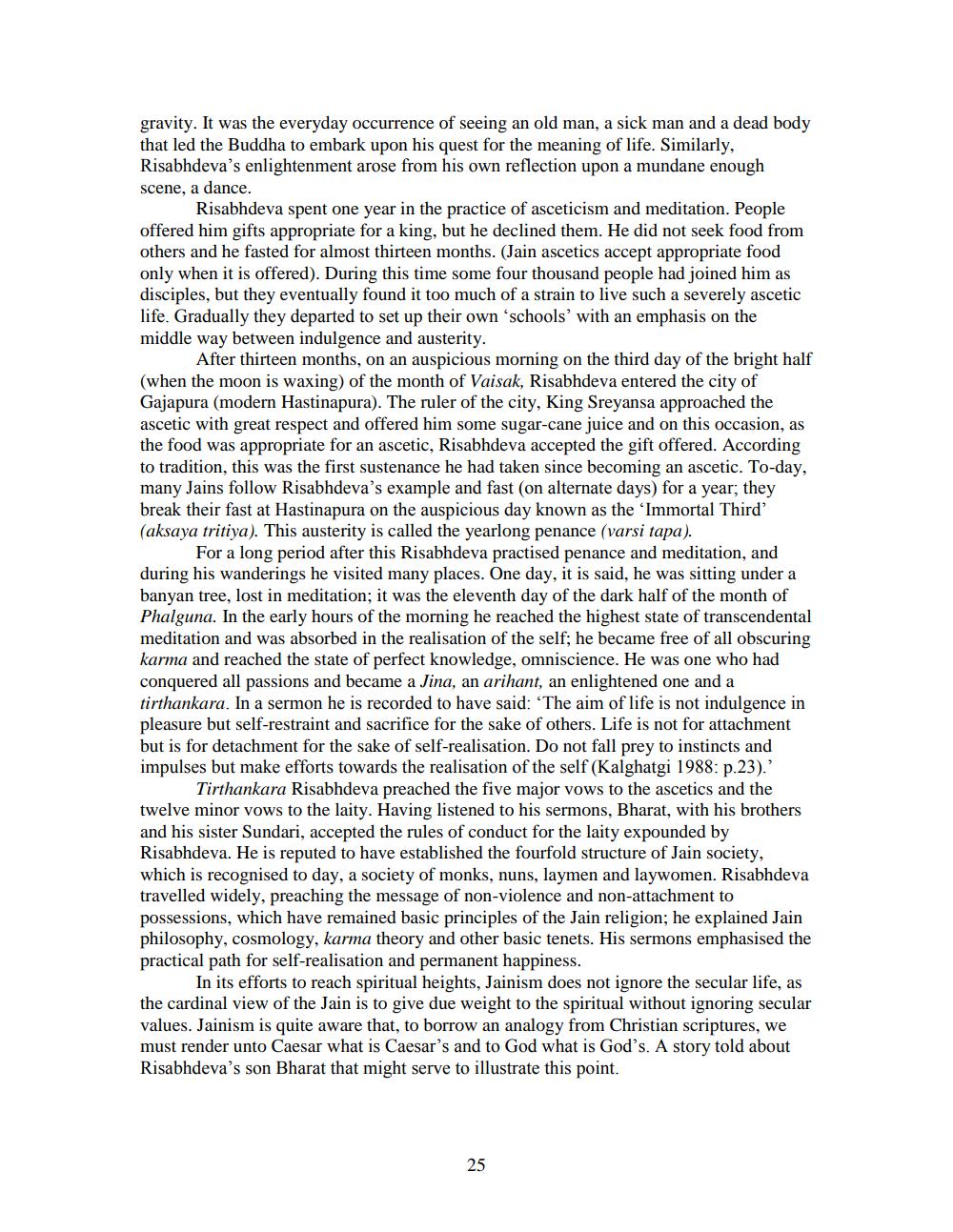________________
gravity. It was the everyday occurrence of seeing an old man, a sick man and a dead body that led the Buddha to embark upon his quest for the meaning of life. Similarly, Risabhdeva's enlightenment arose from his own reflection upon a mundane enough scene, a dance.
Risabhdeva spent one year in the practice of asceticism and meditation. People offered him gifts appropriate for a king, but he declined them. He did not seek food from others and he fasted for almost thirteen months. (Jain ascetics accept appropriate food only when it is offered). During this time some four thousand people had joined him as disciples, but they eventually found it too much of a strain to live such a severely ascetic life. Gradually they departed to set up their own 'schools' with an emphasis on the middle way between indulgence and austerity.
After thirteen months, on an auspicious morning on the third day of the bright half (when the moon is waxing) of the month of Vaisak, Risabhdeva entered the city of Gajapura (modern Hastinapura). The ruler of the city, King Sreyansa approached the ascetic with great respect and offered him some sugar-cane juice and on this occasion, as the food was appropriate for an ascetic, Risabhdeva accepted the gift offered. According to tradition, this was the first sustenance he had taken since becoming an ascetic. To-day, many Jains follow Risabhdeva's example and fast (on alternate days) for a year, they break their fast at Hastinapura on the auspicious day known as the 'Immortal Third' (aksaya tritiya). This austerity is called the yearlong penance (varsi tapa).
For a long period after this Risabhdeva practised penance and meditation, and during his wanderings he visited many places. One day, it is said, he was sitting under a banyan tree, lost in meditation, it was the eleventh day of the dark half of the month of Phalguna. In the early hours of the morning he reached the highest state of transcendental meditation and was absorbed in the realisation of the self; he became free of all obscuring karma and reached the state of perfect knowledge, omniscience. He was one who had conquered all passions and became a Jina, an arihant, an enlightened one and a tirthankara. In a sermon he is recorded to have said: "The aim of life is not indulgence in pleasure but self-restraint and sacrifice for the sake of others. Life is not for attachment but is for detachment for the sake of self-realisation. Do not fall prey to instincts and impulses but make efforts towards the realisation of the self (Kalghatgi 1988: p.23).'
Tirthankara Risabhdeva preached the five major vows to the ascetics and the twelve minor vows to the laity. Having listened to his sermons, Bharat, with his brothers and his sister Sundari, accepted the rules of conduct for the laity expounded by Risabhdeva. He is reputed to have established the fourfold structure of Jain society, which is recognised to day, a society of monks, nuns, laymen and laywomen. Risabhdeva travelled widely, preaching the message of non-violence and non-attachment to possessions, which have remained basic principles of the Jain religion; he explained Jain philosophy, cosmology, karma theory and other basic tenets. His sermons emphasised the practical path for self-realisation and permanent happiness.
In its efforts to reach spiritual heights, Jainism does not ignore the secular life, as the cardinal view of the Jain is to give due weight to the spiritual without ignoring secular values. Jainism is quite aware that, to borrow an analogy from Christian scriptures, we must render unto Caesar what is Caesar's and to God what is God's. A story told about Risabhdeva's son Bharat that might serve to illustrate this point.
25




